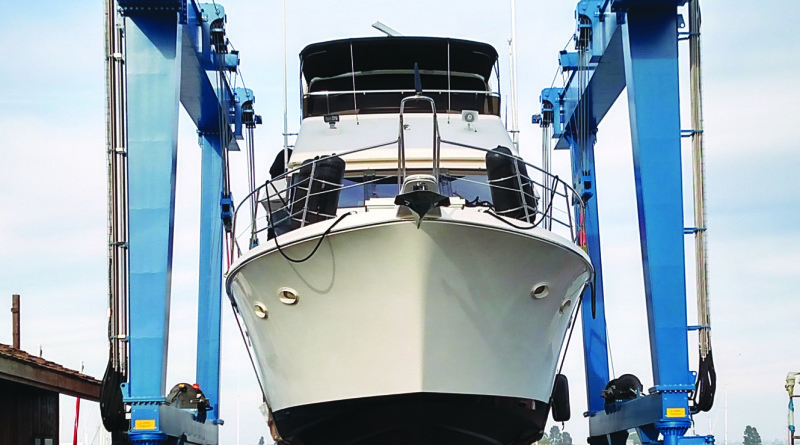Dock Lines: Considering Boatyards
This year, when the Sunroad Boat Show sailed into our marina in January and we again needed to vacate our slip, Arv and I opted to tend to pesky maintenance issues requiring a boatyard visit, including an overdue haulout and fresh bottom paint.
This experience dredged up several disconnected observations about the greater environmental sensitivity of west coast boatyards, plus the critical importance of clear communications in dealing with boatyard staff.
I’ve always enjoyed spending time in boatyards, talking to people, looking at work underway and watching boats moving in and out of the water.
In past years we’ve combined an Ensenada mini-vacation with a visit to Baja Naval Boatyard, but this year, because of the unpredictability of El Niño storms and required advance scheduling, we chose to stay local and use a nearby Shelter Island yard.
As I’ve explored yards in San Diego and Ensenada, I’ve chuckled at the contrast in environmental practices with the small, rural boatyards we used to use on the Chesapeake Bay.
At San Diego and Ensenada yards — all impressive in their professionalism and environmental care — contaminated water is collected via a catchment system, discarded zincs are recycled and boats undergoing painting are carefully screened off.
At our Chesapeake Bay boatyard, not so much. There, after the power washing following our haulout, the creek ran indigo from washed-off old bottom paint. Removed zincs were dropped and left to molder in the creek. Unscreened paint spray flew through the air.
Although I had glimpses of larger, well-run boatyards in the mid-Atlantic region, I didn’t fully appreciate professionally run boatyards or environmental concerns until moving west.
One thing remains common at boatyards, wherever located: people like to complain.
Fortunately, we’ve had solid, pleasant experiences at every boatyard we’ve patronized, whether the dinky two-boat capacity yard at our old Maryland marina or the four larger, efficient yards we’ve used in San Diego and Ensenada. We’ve also readily resolved any work-related concerns.
I long ago realized it’s no accident we’ve had mostly positive boatyard experiences while many others leave unhappy.
It’s usually a matter of communication and regular interaction with boatyard personnel — or lack thereof. Now, when I hear boatyard complaints, I ask what instructions the owner gave the yard.
Usually I discover the instructions were fairly vague — such as, “fix it!” —, mostly verbal and rarely written, nor was an estimated cost discussed. Often the owner didn’t really understand what the issue(s) may be and felt ripped off when the yard discovered related or underlying problems necessitating more work, which, of course, increased the bill. The owner may not be available for consultation when the yard staff needs to discuss extra work, resulting in completion delays or charges for unanticipated but essential work.
In contrast, before entering the yard, Arv, a professional engineer and licensed captain who does most of our maintenance, always discusses any work with the yard manager. We deliver the boat to the yard with a written, detailed work list. And — critically — one of us is always available, by phone or in person, to monitor progress and discuss any needed additional work the yard may identify. We sense that boatyard staff appreciate our availability and involvement.
To achieve a positive outcome at the boatyard, check out and choose your boatyard carefully, inquiring about any discounts or special deals, and understand what work needs to be done. Prepare a written list, visit and inspect the work in progress regularly and make yourself available to the boatyard whenever needed.
Clear communications and interaction are key to a successful boatyard experience.


